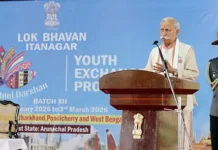ITANAGAR, 6 Oct: The Rajiv Gandhi University Teachers’ Association (RGUTA) and the Rajiv Gandhi University Employees’ Association (RGUEA) on Friday said that they have decided to “temporarily suspend the non-cooperation movement” over the matter of appointment of a new vice chancellor, following discussions with the RGU chancellor and its registrar.
In a press release, the associations informed that the decision has been taken after “RGU Chancellor Dr J Suresh Babu met the two associations on 2 October and appealed to withdraw the non-cooperation movement, stating that the process of appointment of the new regular vice chancellor will not take more than two months.
“Further, the RGU registrar also appealed the same,” they said.
However, reacting to the circular issued by the RGU’s administrative authority, cautioning its employees against participating in the non-cooperation movement, the two associations termed the circular “an attempt to intimidate the employees of the university.”
“The RGUTA and the RGUEA are well-versed with the RGU Act, 2006. The associations did not question the validity of the Act or the visitor. However, any employee has the ‘right to vent’, as per the Madras High Court ruling in relation to WP (MD) No 9754 of 2023, and WMP (MD) No 8689 of 2023,” they said.
“Further, the ruling states that ‘the very purpose of the employees coming together is to negotiate with the management… if necessary, the employees will have to even fight with the management for acceptance of their demands. These are legitimate activities in a democratic republic’,” they said.
“Also, Article 19 (1) (a) of the Constitution of India states that freedom of speech and expression, whereby employees of organisation have the right to express their opinions to the management. The Kerala High Court observed in WP (C) No 27355 of 2018, dated 28.09.2018 (Anil Kumar AP vs Mahatma Gandhi University and Ors) that ‘servitude is an outlook of an individual and not a governing norm in a public institution… Survival of public institution depends upon how it accounts for democratic values. Free expression is the cornerstone of the democratic value’,” it said.
“Further, in Lipika Pual vs the State of Tripura and Ors, the Tripura High Court states that a government servant is not devoid of her right of free speech, a fundamental right which can be curtailed only by a valid law. Therefore, the organisations feel that they have not acted against the laid down rules of the Rajiv Gandhi University Act, 2006, or the Constitution.
“Rather, it seems that the university administration is trying to subvert the fundamental rights of the employees by incorporating words and phrases like ’employees cannot question the appointing authority’, ‘no work no pay policy’, ‘entry into service book’, ‘those who are on probation if participated, their service will be broken’ and ‘administrative actions to be initiated against association and it’s leaders’,” the release said.

